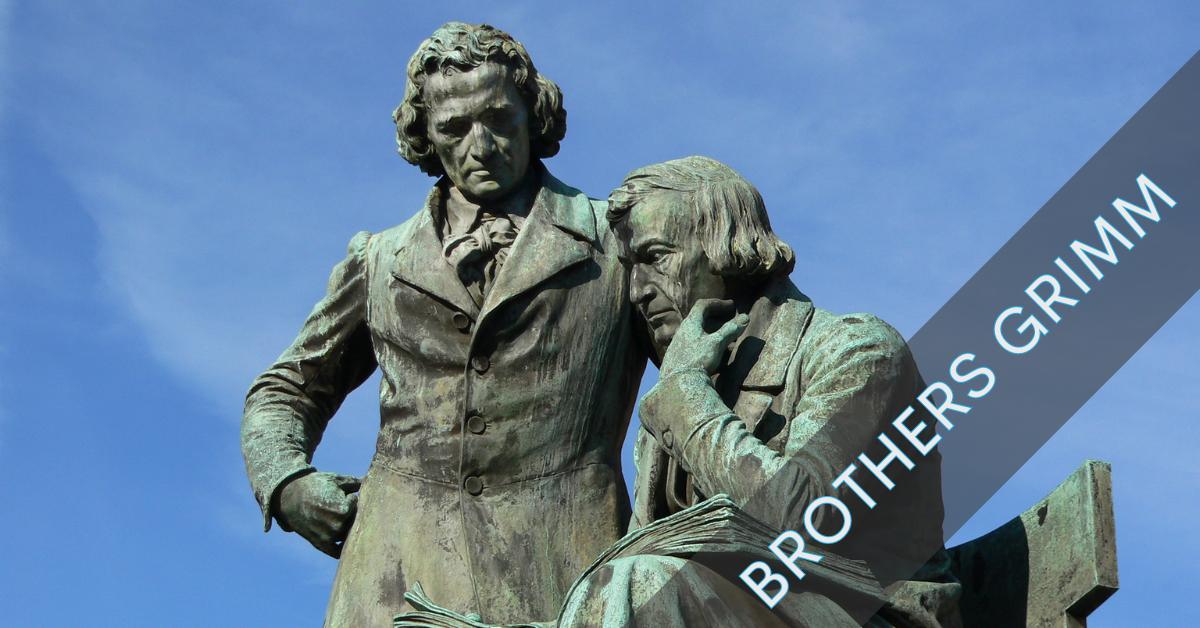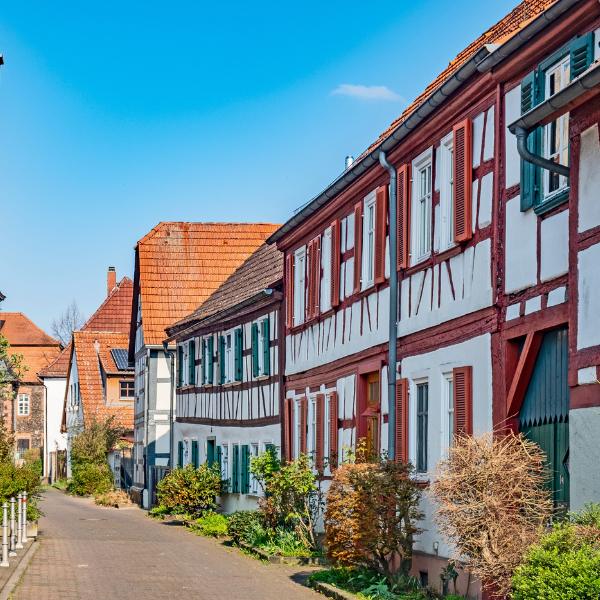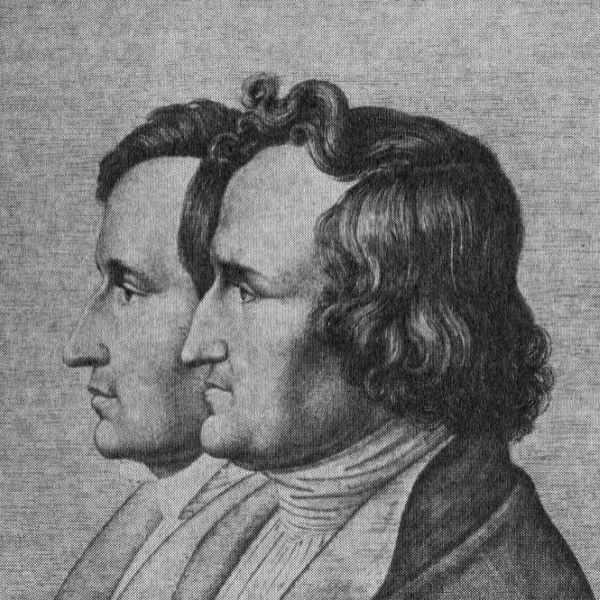- Home
- Famous Germans in History
- Brothers Grimm
History of The Brothers Grimm & The Captivating Tales of Old
Take a leap into the minds of two men of brilliance and captivating narratives.
Collectively known today as 'The Grimm Brothers', this iconic duo made a name for themselves. By using the creative and darker side of the typical fairy tale stories, they created unforgettable pieces of literature that were talked about for decades on end.

These tales are unlike any others. They're powerful, but a little eerie and spooky at the same time. Yet, they're still shared from generation to generation to this day. Their bountiful series of tales are an amazing part of Germany's history. This country definitely produced some unforgettable people, like Mr. Beethoven himself! The jury's still out on Ludwig II, though ...
Let's dive into the late but great whirlwind history of the Brothers Grimm. Something many people don't know about them is that their first success didn't come until quite late in life.
On this page:
Growing the Grimms
In 1785, then only a year later, in 1786, parents Philipp and Dorothea were blessed with two clever baby boys, Jacob Ludwig Carl Grimm, and Wilhelm Carl Grimm. With such a tiny age gap between the two, the boys did everything together. They were described as absolutely inseparable, without question.
Every year since, a new baby blessed the Grimm family, with Dorothea giving birth to a total of nine children, but only six would survive. This growing Grimm group grew up close as a lively family in their love-filled home in Hanau, Hesse, Germany.
 A glimpse into the streets of Hanau where the young boys grew up
A glimpse into the streets of Hanau where the young boys grew upFolk tales would be read to the children often as a way to pass the time while waiting for their father to return home from his magistrate job. These readings certainly influenced the boys' love for creative writing and odd tales later in life!
In 1791, a big decision was made to move the family from the busier area of Hanau to the countryside of Steinau. All the happiness of their past home went with them. Jacob and Wilhelm had private teachers come to their home to teach them literature and creative writing. Dorothea had noticed their imaginativeness from a young age and was determined for them not to lose that spark.
Little did this happy-growing Grimm family know that soon their world would be turned upside down.
A Change Of Pace
Heartbreakingly, only five years later, the father, Philipp, passed away from pneumonia. This shook the world for the Grimm family, leaving them no choice but to downsize to a tiny home, quit private education, and seek financial help from other family members.
The brothers, especially Jacob, being the oldest, had to step up and try to help his grieving mother and family as best as he could. A heavy burden for an 11-year-old boy.
With the help of their aunt later down the line, the boys' education wasn't in jeopardy anymore. She paid their way into university to continue their literary path.
A Love and a Harsh Reality
 The remarkable University of Marburg. A highlight in the brothers history!
The remarkable University of Marburg. A highlight in the brothers history!It wasn't until their years attending Marburg University that they realized the love they had for German folklore. The Brothers Grimm had grown up listening to them all their lives, but when given the opportunity to expand their minds and create their own writings, the love grew fonder.
They met friends—people like them—who loved literature and odd tales. This was something that the two of them never had much of growing up with, having a private education and only ever spending time with their abundance of siblings. However, they would soon learn the harsh reality of classes. They were excluded from social gatherings due to being from a poor family. This only gave them the drive to push and succeed!
A Congatulations is in Order!
Succeed they did! But it wasn't an easy road to get the congratulations they both deserved. Jacob was supposed to be financially supporting his entire family, so the brothers left the university to find jobs to do so. Their mother would pass on a few years later, and the brothers gathered enough money to support their siblings and even send their younger brother, Ludwig, to art school. Now that's brotherly love.
Jacob Grimm and Wilhelm got jobs together in Kassel for the King of Westphalia in the royal library. What an honor! During this time, they continued scholarly work for the university, writing and drawing out their own story ideas. Through all this hardship, they never let their love for folklore get away from them. They would write on the side and start a collection of folk tales.
Napoleon Bonaparte's invasion and attack of their motherland, along with the rumblings of war, pushed the brothers even harder to make something brilliant and impactful.
 The Grimm Brothers famous book of fairy tales
The Grimm Brothers famous book of fairy talesDid you know this?
The Brothers Grimm didn't write Cinderella, Rapunzel, or Snow White. They merely rewrote the original folk stories in a more readable manner. Making them longer and a little more dark and interesting. Why? They didn't want these tales full of opportunity to get lost in history!
By 1812, they had published their first book, Kinder- und Hausmärchen (Nursery and Household Tales), which held a collection of stories: eighty-six different household tales, folklore stories, mythological tales of beasts, and more. Among these tales were world-renowned classics like Cinderella, Hansel and Gretel, Little Red Riding Hood, and Snow White and the Seven Dwarves.
The book took off in popularity, and congratulations were finally in order. Universities recognized the Brothers Grimm, and they were finally rewarded with their doctorates from the University of Marburg. This recognition and the sale of their new successful novel landed them both well-paying jobs as professors at the University of Göttingen.
Banishment Under Rule
Soon after, in 1837, King Ernest Augustus demanded that all Göttingen professors pledge an oath of allegiance to him. When the two brothers refused to pledge to the King, they were fired and made to leave the city in shame.
There was so much revolt, violence, and political upheaval happening throughout Germany during this time, and the brothers were left jobless and reaching out to friends for help. But the hardships were finally coming to an end. The King of Prussia offered two jobs at the University of Berlin (Prussia's capital at the time) in 1840, where they lectured as new and respected members of the Royal Academy of Sciences.
 My very own picture of the University that I captured in Berlin. Little did I know that the famous Grimm Brothers taught here!
My very own picture of the University that I captured in Berlin. Little did I know that the famous Grimm Brothers taught here!One Last Project
Perhaps the banishment turned out to be a good thing. Jacob and Wilhelm went on to get a nice home in Berlin, where they would work on their latest masterpiece that they had started years before. A complete German dictionary, Deutsches Wörterbuch. Sadly, this would be the last of their famous writings. For the remainder of their lives, they worked on this dictionary.
Wilhelm passed away in 1859, and Jacob continued work on the dictionary until he passed away in 1863. Many considered it a blessing for him not to live any longer, as he was heartbroken and became ill due to the loss of his best friend and brother.
This dictionary is an honorable mention, as not many know that they did this among the enormous success of their fairytale book.
Where to Honor the German Brothers
The famous Brothers Grimm are buried in Schöneberg at the Alter St-Matthäus-Kirchhof — a cemetery where a few other big names are laid to rest. Perhaps the name Max Bruch rings a bell? He was a famous jack of all-trades violinist, composer, writer, and more.
Another great stop to honor the brothers is their beautiful Hanau monument in the center of the Marktplatz. One could also visit the city of Hamelin, the location of one of the most eerie classics in German folk tales, The Pied Piper. This is an old poem that the brothers rewrote into their version of the tale.
But the best way to honor these remarkable brothers is to grab their book, Kinder- und Hausmärchen, now known as the Grimm's Fairy Tales, and keep the tradition of passing these tales down from generation to generation alive.

Remembering the Grimms
Of course, the history of the Brothers Grimm goes way beyond this. No one knows everything that happened in their eventful-filled lives. But what we do know is that one might say that the brothers lived in a story of their own — a strange rags-to-riches tale: from poor sons of a state magistrate to two of the most famous men in all of Germany.
It's a shame they will never know the brilliance and childhood storytime memories they've given to so many. Even their rewritten tales hold so many memories of my own childhood. It's so amazing to think of them as we rewatch the Disney classic Snow White or Tangled as the story of Rapunzel.
Sure, the versions that the brothers wrote after the originals still had some cleaning up to do around the edges, but at the end of the day, these tales inspired some of the best animated and live-action films in the world.
Thanks to the determination and creativity of these two men, medieval German literature lives on. Let's keep these oral tales going throughout history!